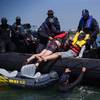USCG, Good Samaritan Rescue Boater on S. Lake Michigan
The Coast Guard and a good Samaritan found and rescued a man Saturday morning, who had been missing since Friday afternoon on lower Lake Michigan.
The Coast Guard is not releasing the man’s name and there is no imagery of video available.
At 6:25 p.m., Friday, a watchstander at Coast Guard Station Calumet Harbor in Chicago received notification from a woman reporting her husband missing in Lake Michigan.
The wife reported that he was to sail in his 24-foot boat from Diversey Harbor in Chicago and arrive in New Buffalo, Michigan, at 4 p.m., but had not arrived or contacted her.
The man did not have his cell phone or a marine radio aboard the boat, but did have a life jacket and emergency flares.
Coast Guard Sector Lake Michigan watchstanders issued an urgent marine information broadcast, advising mariners of the situation, asking them to keep a sharp lookout, to report all sightings to the nearest Coast Guard unit and to assist if possible. The sector also directed several Coast Guard air and boat crews to begin looking for the man.
Searching for the missing person were rescue aircrews from Coast Guard Air Stations Traverse City, Michigan and Detroit, and rescue boat crews from Coast Guard Stations Calumet Harbor, St. Joseph, Michigan, and Michigan City, Indiana. Also assisting in the search was a rescue aircrew aboard a C-130 Hercules airplane from the Joint Rescue Coordination Centre in Trenton, Ontario, Canada.
At 8 a.m., a search-and-rescue controller at Sector Lake Michigan received reports from good Samaritans of a man on a vessel anchored off of Weko Beach in Sawyer, Indiana, 11 miles northeast of New Buffalo, waving a life jacket.
The rescue boat crew aboard a 45-foot response boat from Coast Guard Station St. Joseph responded to the reports and found the missing man, who reported that his boat became disabled during the night. The rescue crew took the boat in tow to a nearby marina in New Buffalo.
The Coast Guard reminds boaters that it is important to always have a reliable means to call for help. Cell phones are a good way to call for help in an emergency; however, most phones are not designed to work in the marine environment and service can become unreliable the farther you get away from the shore. The Coast Guard recommends that boaters use a VHF-FM marine radio. They are designed to work in the marine environment, and the Coast Guard is constantly monitoring the radio for distress calls.
Another great way to signal the Coast Guard for help is to use a personal locator beacon. PLBs are small devices that can be attached to your clothes or life jacket that, once activated, send a signal to satellites and homing beacons aboard Coast Guard rescue craft that can pinpoint your location within 3 feet. They essentially take the 'search' out of search-and-rescue.












